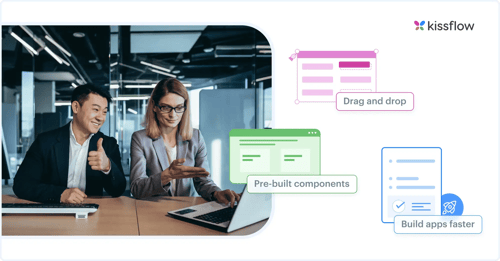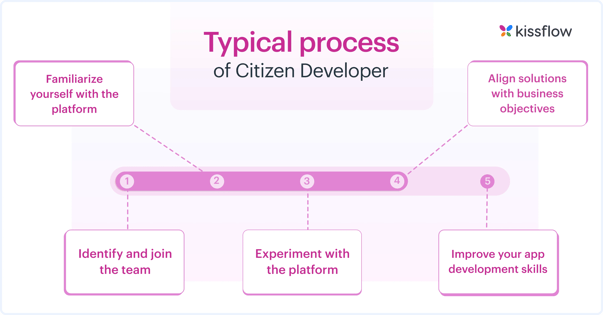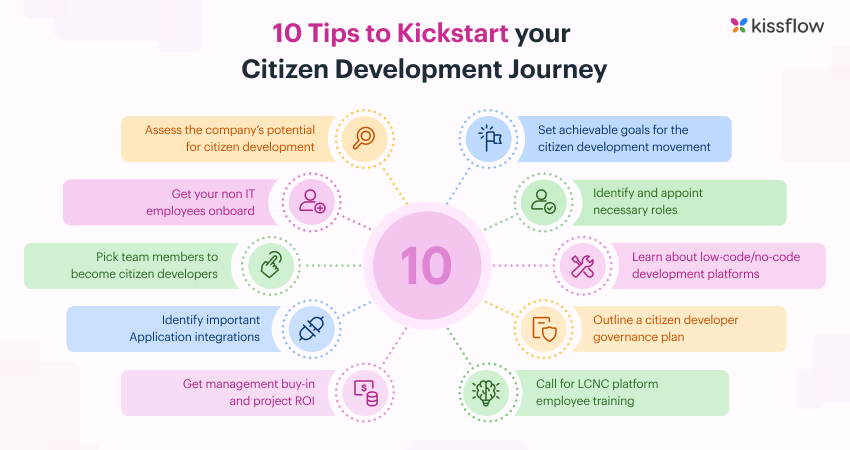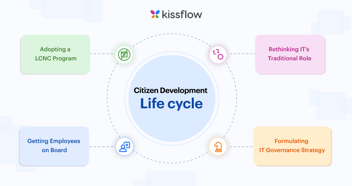
- >
- Citizen Development >
- What is a Citizen Developer? A Detailed Explanation and Guide 2025
What is a Citizen Developer? A Detailed Explanation and Guide 2025
Team Kissflow
Updated on 23 Apr 2025 • 6 min read
As software demand grows and skilled developers are scarce, organizations are turning to citizen development. For a CIO, this strategy expands the pool of developers and encourages innovation across departments. However, it's crucial to ensure proper governance and security measures are in place to manage potential risks.
Citizen development is now widespread across all aspects in an organization. This framework expands your company’s pool of developers by creating citizen developers and brings expertise and unique insight into the software development process. Learn more about the citizen developers meaning and definition below.
What is a citizen developer?
A citizen developer is an employee with no/low coding knowledge who creates software applications for their team or others, using low-code/no-code platforms without the involvement of IT but with IT-approved technology. Citizen developer is a persona and not a role. They build apps in runtime environments with development methods approved and sanctioned by IT.

Every citizen programmer has a different set of skills and knowledge in their respective fields but little to no experience in coding. They are problem solvers driven by change and have some moderate tech skills. The individuals use no-code and low-code platform to bring their ideas to life using drag-and-drop interfaces.
Learn more: Citizen Developer vs Professional Developer
Why companies should invest in citizen developers
Regardless of its size, your company can benefit from citizen development. You can optimize your workforce and resources to solve specific business problems. Here’s why every company needs to invest in citizen it developers:
The global shortage of software engineers may rise to 85.2 million[1] by 2030. Investing in citizen developers allows companies to democratize software development, accelerating innovation and problem-solving. It broadens the pool of talent, reduces dependence on specialized developers, and allows for quicker, more customized solutions to department-specific issues. Here’s why every company needs to invest in citizen developers:
Reduces IT backlog
The increasing need for business apps means IT teams have an ever-increasing to-do list. When IT teams are unable to deliver solutions on time, work stalls, and creates huge backlogs. Citizen development enables business users to create their own apps and can greatly reduce the burden on IT. According to our most recent survey data, 87%[2] of enterprise developers use low-code development platforms for at least some of their development work.
Cost-effective
Citizen development decreases software maintenance costs and maximizes existing resources. It also saves companies money they would have spent hiring professional developers or purchasing third-party applications. By streamlining systems and integrating data, the costs are driven down.
Build apps faster
Market conditions are constantly changing and thus, organizations are forced to release products and services faster. This can easily be achieved with a citizen development framework where non-IT employees use a low-code/no-code platform to build apps at the desired speed and deliver high-quality services.
Increases efficiency
When employees are empowered to become citizen developers, their job satisfaction increases along with their productivity. With less dependence on IT, business users can handle their own requirements. This speeds up the process, and reduces bottlenecks, thereby increasing your organization’s overall productivity.
Learn more: Busting the Top 5 Myths In Citizen Development

The No-Code Approach to Unlock Citizen Development Excellence
Thank you for reaching us!
Thank you for reaching us!
How to become a citizen developer in an organization?
Below are the 5 steps on how to become a citizen developer.
- Identify and join the team
- Familiarize yourself with the platform
- Experiment with the platform
- Align solutions with business objectives
- Improve your app development skills
1. Identify and join the team
The first step to becoming a citizen developer in your organization is showing interest. You’re better placed if your organization already has automated processes. An organization that has already embraced automation may have a citizen development program for its employees. Reach out to the person managing the program and learn how you can participate.
2. Familiarize yourself with the platform
Take time to familiarize yourself with the no-code platform your company uses–if it does. Acquire knowledge by taking part in any training or by reading up. Many software vendors offer citizen developer training, so make the most of it. You can also watch YouTube videos and tutorials, to begin.
3. Experiment with the platform
Experiment with ideas and automate your first workflow using the citizen development platform. Identify the specific process you want to automate then follow these steps.
– Outline the workflow requirements
– Break the requirements into logical steps with a flowchart
– Using the platform, automate the steps and
– Co-relate the steps with the initial requirements
4. Align solutions with business objectives
Once you've automated your first process and it’s approved by IT, the next step is to build again. Consider what you can do to automate processes in your organization and identify pain points where automation can make a difference. Focus on simplifying processes, collaborating, and delivering solutions faster.
5. Improve your app development skills
It’s only natural to want to improve your proficiency once you’ve reached a certain level. To sharpen your skills, keep building apps. Try out different ideas and build applications for different users, departments, the company, or customers.
10 things to consider while you kickstart your citizen development journey
An effective citizen development strategy takes more than just adopting the right technology. Here, we discuss ten aspects to consider while you plan and implement citizen development throughout your organization.

Assess the company’s potential for citizen development
Determine the pain points of the company in digital transformation through surveys or meetings with department heads. After hearing about the departments’ requests for better solutions, the company can make informed decisions and roll out a strategy.
Set achievable goals for the citizen development movement
Organizational goals are an integral part of the citizen development process. Your goals not only have to have an end state in mind but should align with organizational vision and capabilities.
Ask pertinent questions, be prepared to break through inherent barriers and habits, and do not be afraid to align or realign teams to best suit your goals.
Get your employees onboard
Not all employees may become citizen developers, but citizen development impacts the entirety of the organization. It is crucial that every employee understands the need to embrace citizen development.
Adjustments from manual to automated work processes will be met with less friction, and employees will be empowered to learn the nuances of development through LCNC and citizen development.
Identify and appoint necessary roles
Citizen development is carried out in varying levels and departments for optimal performance. Citizen developers may perform a more strategic responsibility of assessing technology and business users’ needs. Tactical citizen developers, on the other hand, review the necessary requirements in integrating business solutions with the existing tech stack with the help of citizen integrators.
Appointing a citizen developer for every department depends on the company’s structure and preference between low-code and no-code development.
Pick team members to become citizen developers
The citizen developer is a forward-thinking business user who can turn ideas into functional and scalable solutions. Under most circumstances, citizen developers only make up a certain percentage of the company’s population. Before rolling out a strategy, identify which business users qualify to construct applications.
Assessing their coding knowledge is also pivotal to determining which low-code/no-code platform is ideal to use.
Learn more: How Low Code Apps Empower Citizen Developers
Learn about low-code/no-code development platforms
Every low-code and no-code development platform features different toolkits and flexibility in constructing applications. Their methodologies may differ and some may be better than others.
No matter what solution you pick, be sure to consider ease of use, track record, and the ability to adopt and deploy quickly.
Learn more: Citizen Developer Apps are the future of App Development. Here's Why
Identify important integrations
Existing technology must not be ignored in lieu of embracing new business solutions. APIs, databases, and more are integral to make the most of applications. Determine which integrations are significant for the low-code applications to perform at optimal performance.
Outline a governance plan
Though low-code development platforms and low-code apps are IT-sanctioned, this does not mean that upholding security measures is no longer necessary. Discuss a citizen development governance plan to add security in place and determine the involvement of the IT department in the management of LCNC platforms and applications.
Be aware of the use of shadow IT in the company.
Get management buy-in and project ROI
Citizen development does not just empower business users to embrace digital transformation. It also improves a company’s return on investment (ROI) and growth compared to a conventional business approach.
Engage the top brass in acknowledging the potential of a citizen developer-led company with a calculation of the estimated company ROI in a few years’ time.
Learn more: How Does Citizen Development Facilitate Digital Transformation?
Call for employee training
Citizen development comes with the promise of empowering non-developers into building simple applications for a simplified work process. Despite not needing programming skills, low-code development platforms may take some time to get used to. Let business users get a good grasp of the platform through comprehensive training.
Best practices for citizen developers
To succeed as a citizen it developer, you need to:
- Save time with schedules
- Document everything
- Collect the right data
- Explore low-code language libraries
- Keep learning
- Always test any changes you make to applications
How Kissflow can empower you to become a citizen developer
Kissflow's citizen development platform is a comprehensive work platform that simplifies the process of building, testing, and iterating your workflow ideas. The platform helps unlock your potential as a citizen developer by allowing you to easily learn how to build a range of products without writing code. So, go ahead and prototype, launch, iterate, and scale apps with Kissflow.
Frequently asked questions
1. How can organizations identify potential Citizen Developers among their employees?
Organizations can identify Citizen Developers by looking for employees who are proactive problem-solvers, comfortable with technology, and have a strong understanding of business processes.
2. What challenges do Citizen Developers face when building applications?
Common challenges include aligning solutions with business objectives, ensuring data security, managing scalability, and integrating with existing IT systems.
3. How do Citizen Developers collaborate with IT teams in an organization?
Citizen Developers work closely with IT teams to ensure compliance with security protocols, integrate applications with existing systems, and receive technical guidance when needed.
4. What governance policies should organizations set for Citizen Development initiatives?
Organizations should establish clear governance policies, including platform access control, application lifecycle management, and compliance with IT standards.
5. How can Citizen Developers measure the success of their applications?
Success can be measured through key performance indicators (KPIs) such as improved process efficiency, reduced manual errors, enhanced user adoption, and ROI from application deployment.
Empower Yourself as a Citizen Developer and Start Creating Apps Today
Related Articles










